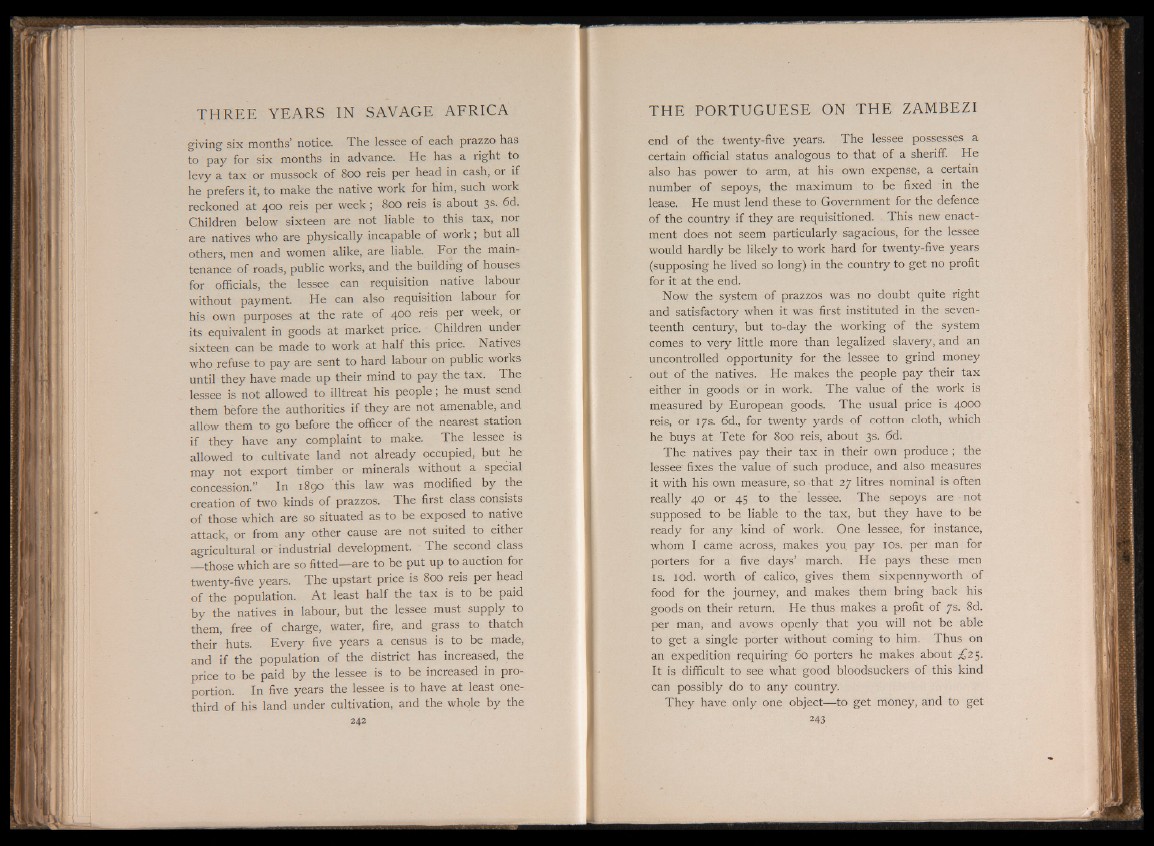
giving six months’ notice. The lessee of each prazzo has
to pay for six months in advance. He has a right to
levy a tax or mussock of 800 reis per head in cash, or if
he prefers it, to make the native work for him, such work
reckoned at 400 reis per week ; 800 reis is about 3s. 6d.
Children below sixteen are not liable to this tax, nor
are natives who are physically incapable of work; but all
others, men and women alike, are liable. For the maintenance
of roads, public works, and the building of houses
for officials, the lessee can requisition native labour
without payment. He can also requisition labour for
his own purposes at the rate of 400 reis per week, or
its equivalent in goods at market price. Children under
sixteen can be made to work at half this price. Natives
who refuse to pay are sent to hard labour on public works
until they have made up their mind to pay the tax. The
lessee is not allowed to illtreat his people; he must send
them before the authorities if they are not amenable, and
allow them to go before the officer of the nearest station
if they have any complaint to make. The lessee is
allowed to cultivate land not already occupied, but he
may not export timber or minerals without a special
concession.” In 1890 this law was modified by the
creation of two kinds of prazzos. The first class consists
of those which are so situated as to be exposed to native
attack, or from any other cause are not suited to either
agricultural or industrial development. The second class
those which are so fitted—are to be put up to auction for
twenty-five years. The upstart price is 800 reis per head
of the population. At least half the tax is to be paid
by the natives in labour, but the lessee must supply to
them, free of charge, water, fire, and grass to thatch
their huts. Every five years a census is to be made,
and if the population of the district has increased, the
price to be paid by the lessee is to be increased in proportion.
In five years the lessee is to have at least one-
third of his land under cultivation, and the whole by the
242
end of the twenty-five years. The lessee possesses a
certain official status analogous to that of a sheriff. He
also has power to arm, at his own expense, a certain
number of sepoys, the maximum to be fixed in the
lease. He must lend these to Government for the defence
of the country if they are requisitioned. , This new enactment
does not seem particularly sagacious, for the lessee
would hardly be likely to work hard for twenty-five years
(supposing he lived so long) in the country to get no profit
for it at the end.
Now the system of prazzos was no doubt quite right
and satisfactory when it was first instituted in the seventeenth
century, but to-day the working of the system
comes to very little more than legalized slavery, and an
uncontrolled opportunity for the lessee to grind money
out of the natives. He makes the people pay their tax
either in goods or in work. The value of the work is
measured by European goods. The usual price is 4000
reis, or 17s. 6d., for twenty yards of cotton cloth, which
he buys at Tete for 800 reis, about 3 s. 6d.
The natives pay their tax in their own produce ; the
lessee" fixes the value of such produce, and also measures
it with his own measure, so -that 27 litres nominal is often
really 40 or 45 to the lessee. The sepoys are not
supposed to be liable to the tax, but they have to be
ready for any kind of work. One lessee, for instance,
whom I came across, makes you. pay 10s. per man for
porters for a five days’ march. He pays these men
is. iod. worth of calico, gives them sixpenny worth of
food for the journey, and makes them bring back his
goods on their return. He thus makes a profit of 7s. 8d.
per man, and avows openly that you will not be able
to get a single porter without coming to him. Thus on
an expedition requiring 60 porters he makes about £25.
It is difficult to see what good bloodsuckers of this kind
can possibly do to any country.
They have only one object—to get money, and to get